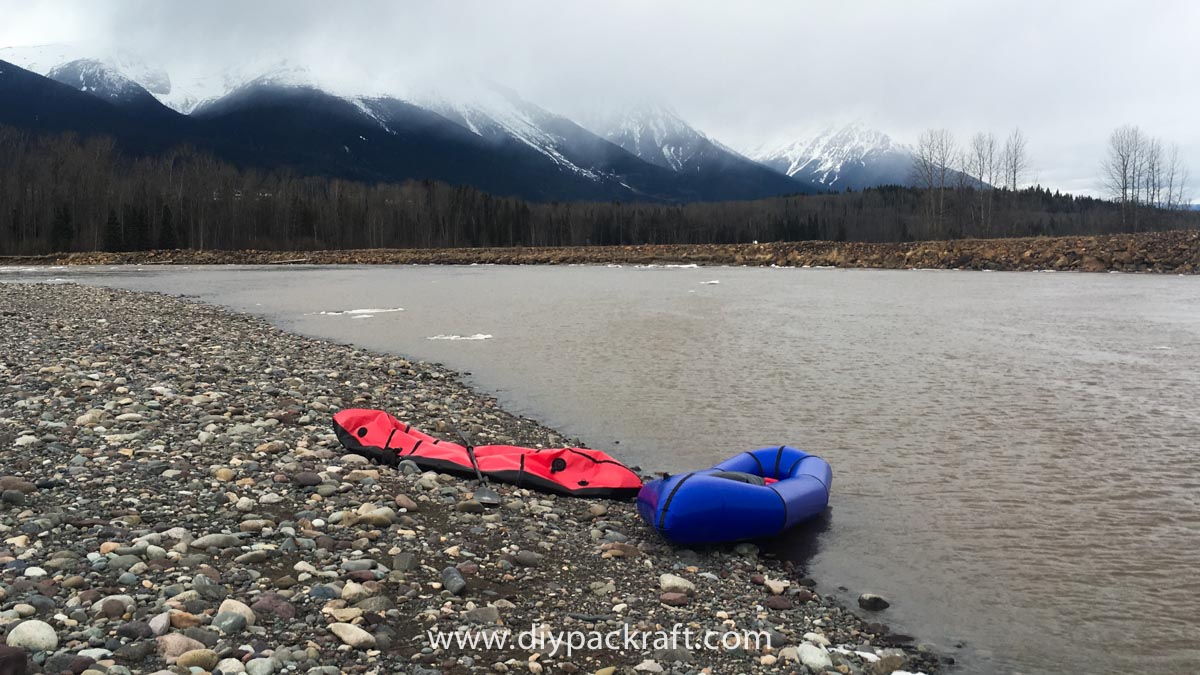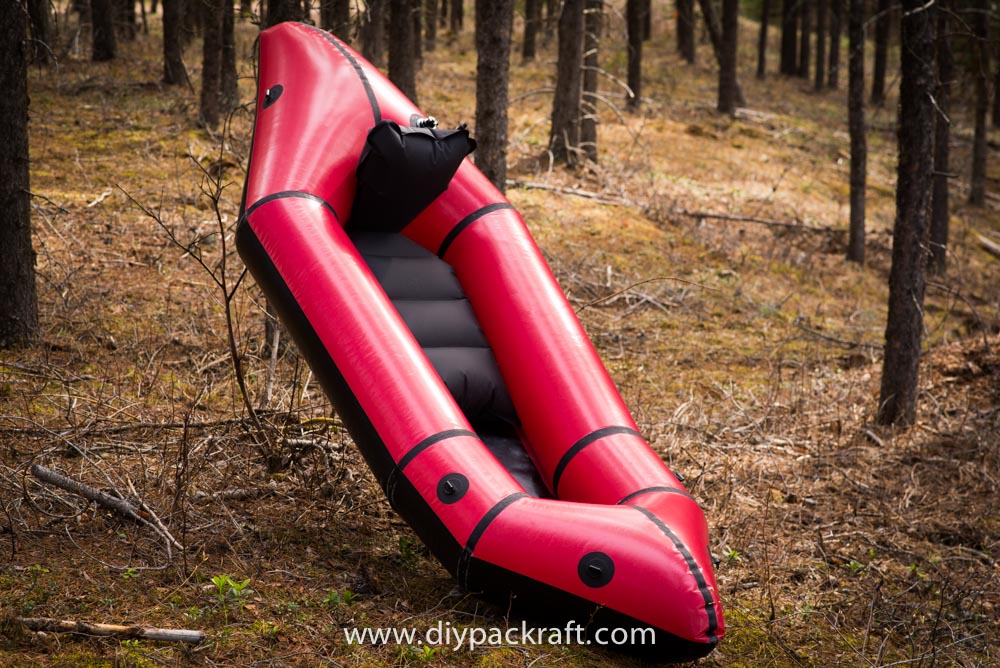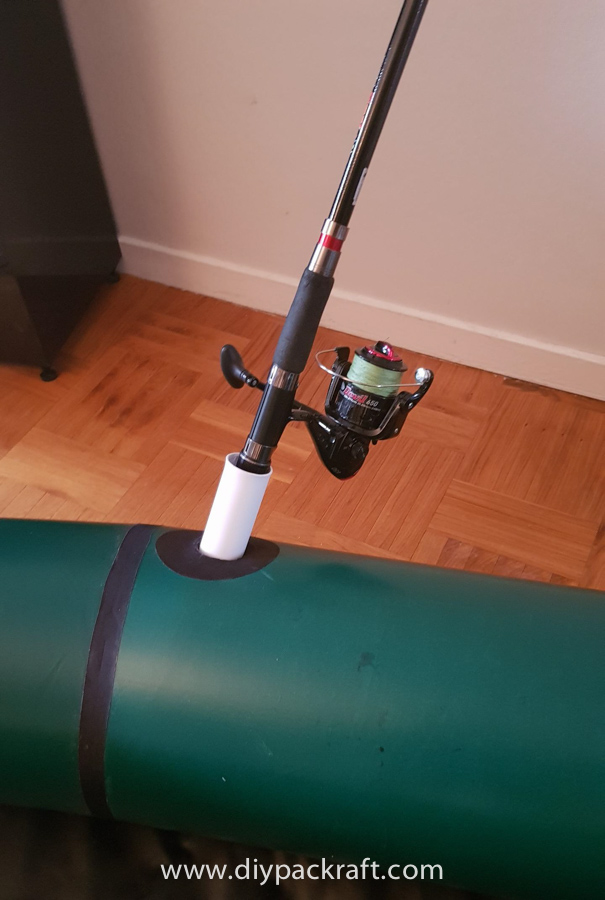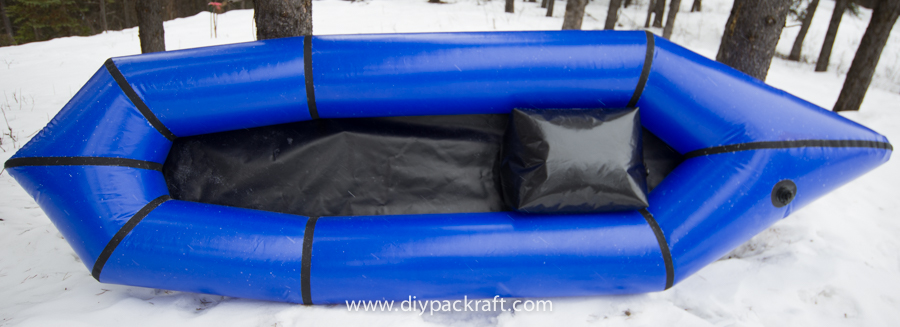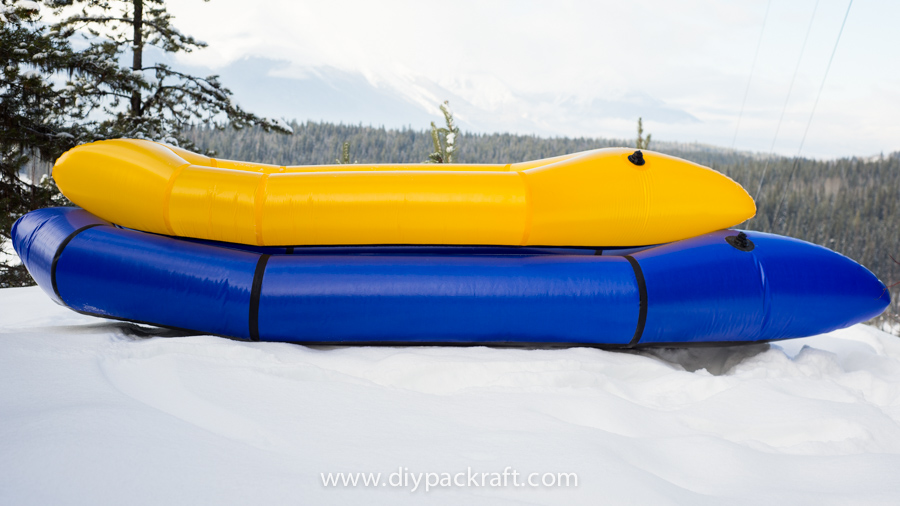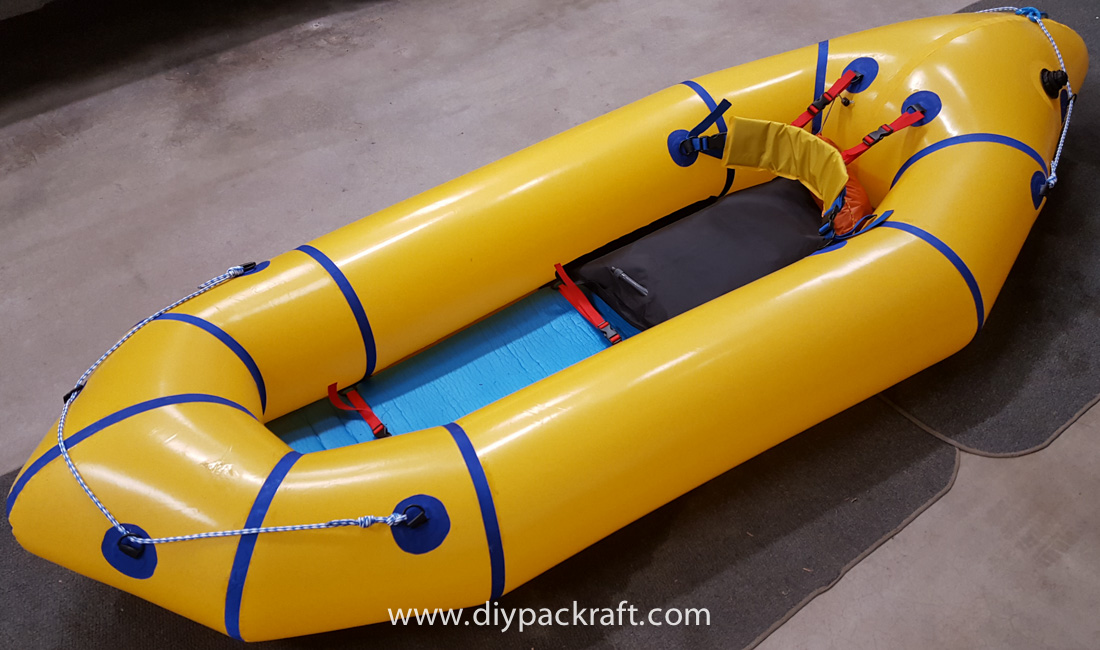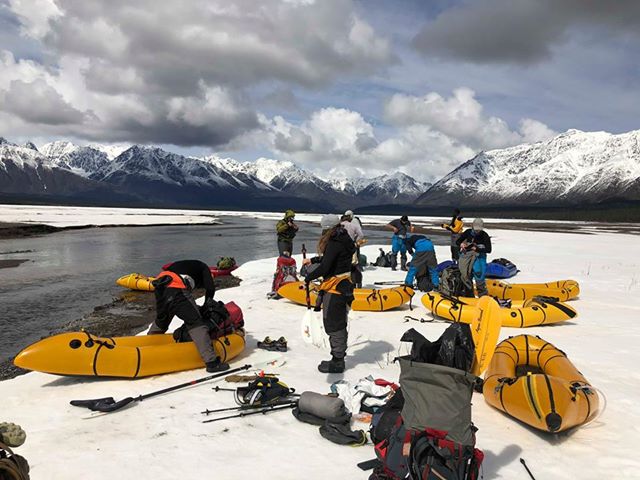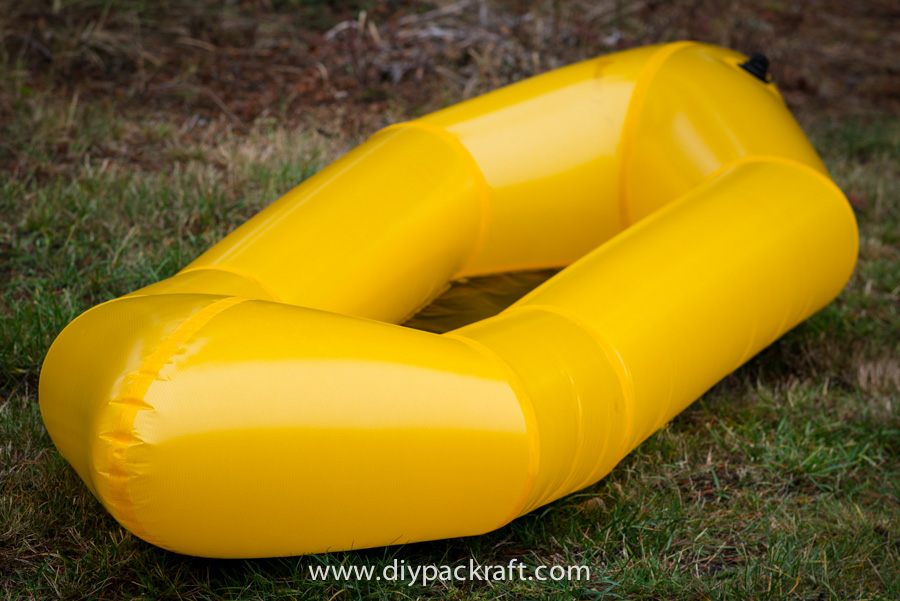-
Matt (Admin) replied to the topic Long Top Off Tubes in the forum DIY Packrafts 5 years, 6 months ago
Yep, you just have to cut the black tube and insert some flexible tubing (or rigid tubing pieces that you can then attach flexible tubing to). You can get clear PVC tubing at most hardware stores, and that should work well enough for float bags. Cheers!
-
Matt (Admin) replied to the topic TPU heat damage and repair? in the forum DIY Packrafts 5 years, 6 months ago
Yes, I’ll help you out if that’s what you prefer – just send me a message through the Contact form.
-
Matt (Admin) replied to the topic Colorado River In Glen Canyon On My V3 in the forum DIY Packrafts 5 years, 6 months ago
Fantastic! Beautiful pictures and great trip report! And thanks for the valuable feedback. Cheers!
-
Matt (Admin) replied to the topic Heat-sealing tools in the forum DIY Packrafts 5 years, 7 months ago
The iron I’ve been using lately is the leather iron from Alibaba.com. It requires some modification, but it’s better than the Black Baron because it’s narrower (more info here: https://www.diypackraft.com/construction/tools/ ). I see they’re also selling them on Amazon now too:…[Read more]
-
Matt (Admin) replied to the topic TPU heat damage and repair? in the forum DIY Packrafts 5 years, 7 months ago
By the looks of it, it’s probably not still airtight, so I would heat seal some scrap yellow fabric over the damaged areas, and then add some Seam Grip or Aquaseal along the edge between the patch and the black fabric, if necessary.
-
Matt (Admin) wrote a new post 5 years, 7 months ago
Last weekend the ice on my local river had opened up enough for me to go paddling, so I spent an hour navigating some Class 1 water while dodging ice rafts in the new 1-person packraft with the wrap-around floor. […]

-
I haven’t calculated it yet, but it should be comparable to the V3 plus a bit for some extra things that will be included that the V3 kit doesn’t have.
-
Hi Matt,
Any chance we can get the new design, but without the wrap around floor? I’d want beefier fabrics than the ultralight kit (210D tubes, 410D floors), but would like the ease of construction and improved paddling speed compared to the V3. I’m not sure the type of water I’m in warrants the wrap around floor.
Thanks,
Joe-
Hi Joe, yeah, I’ll likely do a regular version of a similar design – not sure when I’ll be able to get to it. It’s good to know people are interested though!
-
-
-
Matt (Admin) wrote a new post 5 years, 7 months ago
Notice anything unusual about this packraft?
2.278 kg, or 5.0 lbs
The tough floor fabric wraps halfway up the tubes to make this DIY Packraft extra tough where it counts, and it’s still […]

-
Hi Dan, I’m going to paddle it and the new 2-person packraft for the first time this weekend, and if all goes well I hope to have kits available later this month. No guarantees though!
-
Hi Nick, I’ll be testing out a seat for this packraft this weekend – I suspect it might need a bit more work, but yes, I hope to have it in the shop soon. Cheers!
-
Yep, you’re right – it’s got a higher volume bow and stern.
-
No, there’s nothing about the V3 design that precludes a wrap-around bottom, but I don’t intend to offer it as an option.
-
Hi Christian, thanks for your interest! It depends on the type of paddling you want to do, but if weight isn’t your main concern, personally I would choose the new model. Aside from the design updates, the instructions will be easier to follow. It’ll be in the shop quite soon. Cheers!
-
I don’t foresee any issues with the seat back interfering with a spray deck – just place the cockpit coaming back far enough so the seat back doesn’t push against it. Thigh straps shouldn’t be a problem either. If you don’t like the seat you can cut off the seat back and just make a flat seat instead and add a back band or something else (or just cut the seat back shorter). If you get an extra top-up valve (or repurpose the one intended for the packraft) you could turn the seat back into an inflatable foot rest or a pillow to go between your knees. There are lots of possibilities. Cheers!
-
I haven’t designed one yet, but it’s certainly possible!
-
Yeah, I’ll probably make a video of the new packrafts after I finish all the instructions.
-
I see you found it 😀
-
Yup waiting eagerly for it to arrive now!
-
I’m really interested in this design for a couple river (moderate whitewater) trips. Do you have the interior width (front and rear, since it clearly tapers)? I’m looking at the two smallest sizes. Shifting weight forward for better weight balance (fore/aft) is a pretty standard packraft design (the included seat design does that to some extent), and I’m wondering if I will get a good fit width wise if I go that route.
-
The interior width tapers from 37 cm (14.5″) to 21 cm (8.25″) in all three sizes. It’s designed to fit snugly around your hips, and being inflatable, it can stretch to accommodate wider bodies. Cheers!
-
-
I purchased a Telkwa kit from Matt in late June and finished it in early August. Building it was much like the V3 I built last January. However, there are a few key differences and so you should certainly review Matt’s updated Telkwa build videos to avoid some of the mistakes I made. Probably the biggest difference is that now Matt recommends using the “inside out” construction technique. I used that and found that it does aid in better access to the weld areas. On the down side, it also works the material pretty hard and there are touch up welds or seam grip “repairs” needed if you don’t take lots of care to get your welds right the first time. A person could still build the Telkwa using the V3 method as an alternative if so wished. I purchased my Telkwa kit with the zipper which definitely aided in the construction, especially in closing the aft seam.
I feel like the cockpit is just a bit narrower than the V3 as is the foot compartment. Still, there is room for me in the 130cm size.
The new seat design is fantastic with the pillow back. However, I definitely recommend sealing the seat separate from the seat back because while sitting on a partially inflated seat, my body weight pushed all the air into the back which left me with no air in the seat bottom. After I ironed the neck closed, I added a top off valve to the seat back. I put more air into the seat back and that gives great back support. Less air in the seat keeps my center of gravity lower in the boat but still keeps my butt off the floor.
I have taken my Telkwa on the middle Yellowstone River several times now, riffles only, maybe a possible low-end class 1 rapid. The Telkwa tracks much better in the water than the V3 does because of the more stream lined bow. I always add about 25# (12 kilos) to the front to keep it level in the water (a big, rounded rock has been used in the bow compartment a time or two, as well). I’m really pleased with how it handles. I have hit a few “butt dragger” shallows and had no fear of the bottom opening up. The extended floor up the side walls of the tubes gives me a bit more secure feeling should I scrape a log or rock although I have not done that and really try to keep from doing that.
My Telkwa weighs within an ounce or two of the V3 and pumps up with the same number of strokes from my small piston pump. My boating friends are amazed that I have built my own boats and are envious of the light weight when hauling gear back to the car shuttle or when hiking to a mountain lake (V3).
-
-
Matt (Admin) wrote a new post 5 years, 8 months ago
For about $10 you can have a shiny new roller like this one.
When heat sealing TPU coated fabrics together, it’s important to apply pressure to the fabric as it cools, otherwise it tends to buckle and lift […]

-
YES, this works even better in combination with a hot air soldering station:
https://www.banggood.com/858D-220V-Hot-Air-Soldering-Rework-Station-Handle-Handle-Stand3-Nozzles-p-1129100.html?rmmds=buy&cur_warehouse=CN-
That’s the same one I bought! It does a good job of sealing the fabrics together quickly, but so far I haven’t figured out how to use it without melting too much TPU, so I haven’t incorporated it into my workflow. Do you have any advice on which settings to use?
-
I also have an 858D – squeeze a nozzle down to make a slot around 24mm wide. The air flow is quite low, so if it’s used at 220C or so the heat will spread out too much. Wind the temp up to 300 or more (even 400) and roll at a speed to suit and it will melt only the target you want. A bit like quickly searing a steak, rather than slowly cooking it right through.
-
we made a video about it:
-
Thanks for making the video! I have been trying to direct the air between the fabric layers (the way an industrial hot air welder does), but I don’t have enough hands to hold everything. Your method is much simpler – I will try it!
-
yes, you still need both hands to do it, so everything mustbe fixed in place by tape before you begin welding
-
-
Hey Naas,
What’s the strategy for the middle of the tubes? I imagine it’s tough getting the roller and the air gun to the center of the tube portions. Also, did you start sealing from the middle out, or did you start from one end with the pieces taped. How are you protecting the TPU in the middle on the floor and on the pieces adjacent to the seams or have you found it’s not much of a problem?
-
Also, I’ve been trying your method on some scraps, and found (at least according to the what sealing methods page) that my welds when pulled apart have the tpu all come off in one sheet on one side of the fabric. I also can’t seem to tell the difference between a strong weld and a weak weld until I pull them apart (they all look properly sealed until I rip them apart and the tpu all sheds off on one side). What do you guys think? Is the blower too hot? I’m wondering if the table beneath the blower is making the tpu on the bottom side not heat up enough and it’s therefor not welding properly. Thoughts? Matt have you dabbled with this method yet?
-
I’ve played with it a bit, but not to the point where I’m comfortable using it. I think the keys are to apply heat equally and evenly to both pieces of fabric and to not overheat them, and I find all of those things challenging.
-
Yeah, after a few hours of using it, that seemed to be my impression. In addition to welding irregularly (I think 1/8 worked properly), my iron shit the proverbial bed and wouldn’t get hot the second time I fired it up, so maybe an additional demerit. It’s being returned (which was fairly easy thanks to Amazon).
I ordered a coverite black baron (the last one I could find on ebay) and they shipped it to my address from 7 years ago (that was my fault) so I’m without a backup for the time being. I will now probably try the leather iron you recommended, but they still take a few weeks. I’d say the hardest part of this process thus far is finding a proper tool to use… Anyway, back to tool shopping…
-
-
-
-
-
-
YES, this works even better in combination with a hot air soldering station:
https://www.banggood.com/858D-220V-Hot-Air-Soldering-Rework-Station-Handle-Handle-Stand3-Nozzles-p-1129100.html?rmmds=buy&cur_warehouse=CN -
See the link in the first comment above.
-
-
Matt (Admin) replied to the topic Snow, sun, water packraft and some swimming in the forum DIY Packrafts 5 years, 8 months ago
Thanks for the great story of your maiden voyage!
How do you like the red press-fit valve and Schnozzle combination? Does it take too long to deflate with the single valve?
In the newer kits I’ve replaced the beach ball-style seat valve with a top-up valve, and that fixes the unexpected deflation issue. If you switch to a red valve, please tell…[Read more]
-
Matt (Admin) replied to the topic First test, whitewater in the forum DIY Packrafts 5 years, 8 months ago
Very nice! 🙂
-
Matt (Admin) wrote a new post 5 years, 8 months ago
Update: Gustav’s detailed fabrication instructions are posted here!
If you’ve ever tried fishing from a packraft, you know that it’s nearly impossible to hold a fishing rod and paddle at the same time. Gustav […]

-
Matt (Admin) replied to the topic Rod holder insert in the forum DIY Packrafts 5 years, 8 months ago
Fantastic! Well done, Gustav, and thanks for sharing! I’ll post this on the blog (with credit to you, of course), as I’m sure other people will be interested and they might not see it here.
-
Matt (Admin) wrote a new post 5 years, 8 months ago
Here in the north we’re deep in winter, so I haven’t had a chance to paddle the new 2-person DIY Packraft yet, but here are a few more pictures that show the new seat design (just one of them, because I’ve only […]

-
Matt (Admin) wrote a new post 5 years, 9 months ago
The new two-person DIY Packraft (blue) with the new Ultralight DIY Packraft (yellow) for comparison.
Packed size: 25 x 25 x 50 cm, or 10 x 10 x 20 inches
Weight: 3.0 kg / 6.6 lbs (with 560 GSM floor, no […]

-
Wow, Matt you’ve advanced the field immensely. This is the best tandem packraft design available. Congratulations. I clearly have to buy one for next winters project!
Bruce
Fairbanks-
Thanks, Bruce! The design changes are largely based on your feedback from the previous version, so thanks for that!
-
-
Hi Ryan, it’s actually already posted on page two of the shop as a sort of soft launch because I haven’t written and recorded the instructions yet or had a chance to paddle it to be sure it performs as expected (everything is still frozen here). I’m pretty confident in the design and I’m working on the instructions, but I don’t have a firm timeline for when they’ll be done. Regarding the price, it’s significantly higher than the previous 2-person kit because it includes way more stuff (not just the bare bones boat pieces).
-
Hi Paddy, the best way to get a sense of the size would be to grab a tape measure and lay out the dimensions (given above) on your floor with tape or furniture and then sit within the lines. I’m sure the seat could be made into a pack – it would require some trial and error to make it comfortable for load carrying. I’ve never made a backpack, myself, so I’m not sure how difficult that would be. Cheers!
-
Matt,
Great job, I’m waiting on my sample pack & your testing of the new 2 person model. Is there a possibility of the wrap around floor on the new 2 person model, lots of rough creeks & rivers in central Texas?-
That might be a possibility in the future, but in general I’d recommend a smaller packraft for shallow creeks, as it’ll be much more maneuverable. Cheers!
-
-
-
Matt (Admin) wrote a new post 5 years, 9 months ago
Ken’s completed V3 DIY Packraft kit with custom blue seams, floor insulation, and back rest.
Ken S. sent me a build report with excellent photos and detailed descriptions of his V3 DIY Packraft build, […]

-
Matt (Admin) replied to the topic DIY Packraft Photos in the forum DIY Packrafts 5 years, 9 months ago
Congratulations! If you run out of room in your freezer, I might have room for a crab or two 😉
-
Matt (Admin) replied to the topic Entry Assist Handles? in the forum DIY Packrafts 5 years, 9 months ago
I haven’t tried this but I find it relatively easy to re-enter a packraft by draping my arms over the side, placing my hands flat on the floor, and then boosting myself up with one big dolphin kick while I push down with my hands – then I sort of flop into the packraft.
Because the air pressure in a packraft is low compared to an inflatable…[Read more]
-
Matt (Admin) wrote a new post 5 years, 10 months ago
The Online Review Economy
 TL;DR: Should DIY Packraft give free stuff to online reviewers like Backpacking Light? I’m the type of person who likes to research the hell out […]
TL;DR: Should DIY Packraft give free stuff to online reviewers like Backpacking Light? I’m the type of person who likes to research the hell out […]-
I’m not sure what you’d really be getting out of the deal. I’m not a BL member, but it seems like there are plenty of avenues for people will find out about packrafts in general. People who would consider DIY as an option will find your website. The end product depends a lot on the person who is assembling it and a one-off review might be done by somebody who is more interested in quick rather than quality work and might not be impressed with their final product.
I will say that most reviews I read are near worthless. Every once and a while there will be gem that shows experience with the product with thoughtful insights.
-
Thanks for your perspective, Daniel – I think you might be right. Cheers!
-
-
Thanks, Steve – those are the same thoughts I’ve been mulling over plus some things I hadn’t really considered, so I appreciate your input. Cheers!
-
Thanks for the insight, Arnold, and the encouragement. I certainly do love working on DIY Packraft stuff. Like anything, there are aspects that aren’t so enjoyable… it would be nice to be able to hire someone to help out so I could accommodate more orders and put more effort into growing a “real business”, but there are zoning and insurance and workplace safety things to figure out before I’ll be able to take that leap. I wouldn’t want to get a big increase in publicity and orders and then be unable to fulfill them in a reasonable amount of time… They say a business that isn’t growing is dying, but I remember when one of the big packraft brands ran their Kickstarter campaign and got so many orders they took forever to fulfill them, and that just seemed to annoy everyone. Eventually they made it work though, so maybe that’s the right way to go.
-
Hi Zach, that’s a great idea. Thanks!
-
Hi Peter – thanks for your thoughtful comments; those are all good points. I haven’t sold so many kits that it’s likely there’s someone in your area who has one, but it is possible – feel free to send me an email, and please put a feeler out on the forum as well.
There actually is a guy in the UK who copied my website and has been selling packraft kits that use the older V2 assembly methods, which is why my newer instructions are password protected. I’d prefer to share everything and encourage people to document their builds in detail, but at the same time it’s annoying to have someone reword my ideas and market them as their own, so now there are certain things I’d rather not have widely publicized. It’s hard to maintain faith in humanity when I get emails from confused customers because someone has purchased a URL almost identical to https://www.diypackraft.com and redirected it to their site…
-
Thanks for the idea, Dan – I’ll give it some thought. And cool tents!
-
-
Matt (Admin) replied to the topic Kit choice for bikerafting? in the forum DIY Packrafts 5 years, 10 months ago
Hi Ben, I’ve used my V3 for bikerafting with my 29″ full suspension bike and it worked well, even in mild rapids. For camping, I’d definitely add a zipper to the boat so you can store gear in the tubes, as the bike takes up pretty much all of the forward deck storage space. I can still fit a day-pack in the cockpit (sort of between my legs), but…[Read more]
-
Matt (Admin) wrote a new post 6 years ago
Update: This packraft is now available in the shop here!
I recently finished building this new Ultralight DIY Packraft. It went together easily and relatively quickly (about fifteen hours including figuring out […]

-
Hi Steve – that’s certainly a possibility for people who want it, as the V3 is still a good all-around design. Since the ultralight boats (hopefully) won’t be shooting any rapids, I wanted to offer an ultralight boat that is a bit easier to assemble and faster on flat water.
-
Thanks, Felix – I just added the results of my speed tests, too!
-
The fabrics are the 115 GSM yellow and 190 GSM black fabrics that are available in the shop. I’ll start selling the kit later in November – I just have to finish figuring out how to produce it and how much it will cost.
-
The 115 GSM ripstop is just too lightweight to use as the floor?
-
No, but being coated on one side it will soak up water weight and end up heavier than the double coated fabric. That, and this design requires bonding to both sides.
-
-
The 115 GSM ripstop is just too lightweight to use as the floor?
-
-
Yes, eventually there will be an update to the V3, though perhaps not with this design. If people want this design made from the heavier fabrics, that could also be a possiblity.
-
Thanks for the question – the 190 GSM fabric has TPU on both sides, so it can’t be heat sealed with an iron in the same way as the single-sided fabrics, so I won’t be offering a kit made entirely from that fabric.
-
Awesome. Very exciting. How can this be leveraged to make a two person boat? Think this fabric can be used with the voyageur template?
-
The plan is the phase out the current Voyageur design now that I have space to make a longer version, but yeah, there could be an ultralight version as well 🙂
-
-
Awesome. Very exciting. How can this be leveraged to make a two person boat? Think this fabric can be used with the voyageur template?
-
Can we order the new design with standard fabrics? That is, 420D floor and 210D tubes? I know the new Telkwa model has the new design but it also has the wrap-around floor which I wouldn’t need, so I’d rather save the weight. But I like the new design for the faster construction time and faster flatwater travel compared to the V3.
-
Stay tuned for this…
-
-
- Load More
